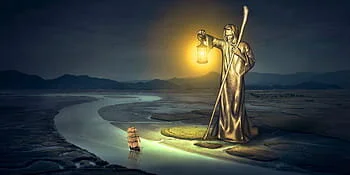Worldbuilding Fantasy ... It's Not That Serious
Where on earth do you begin when it comes to worldbuilding? What is the most important part of worldbuilding? What must you include? What can you leave out? Is it really all that serious??
Worldbuilding can be really intimidating to writers; this isn’t something that is only a little tough to tackle for new authors—it is a looming shadow for each and every writer in existence. Worldbuilding is definitely a common term or concept you will find in genres like fantasy, science fiction, and even steampunk but if you dare to step outside your comfort zone, you’ll see its important in every genre.
That’s right—just because the characters in your YA romance live in a small town in Wisconsin doesn’t mean that you have no responsibility to build a world around them. You don’t have to come up with your own language or culture but even including details about your setting—like a small town, a grocery store owned by the old couple up the street, Bingo Night on Tuesdays—this is still worldbuilding!
What is worldbuilding?
A simple search on Google will tell you it’s the process of constructing an imaginary world, sometimes associated with a whole fictional universe.
The key words to remember here are imaginary and sometimes—now why is the word sometimes important for you to remember? Because this means you can find stories that will contain worldbuilding outside the norm that still classifies as worldbuilding.
You don’t have to be the author of an eight-part-series that takes place on a distant planet with talking trees and a sub-species of humans we’ve never heard of in order to accurately flesh out worldbuilding. You can sit down with a cup of your favorite caffeinated beverage and spend time building an imaginary small town two hours outside of New York City where everyone goes to church on Sunday nights instead of mornings. Just because the foundation of your world didn’t totally emerge from your imagination doesn’t mean you aren’t worldbuilding. Remember our first key word?
Imaginary
As long as some part of your setting is something you have constructed, then congratulations! You’ve just taken your first steps towards worldbuilding.
Now, this article is titled Worldbuilding Fantasy, so I’m going to be tackling a specific genre for the rest of this post but that doesn’t mean you can’t learn a thing or two here and apply it to a different story later. I don’t want this article to get too long, so I’ll likely complete this discussion in a 3-part series. I encourage you to keep reading and hit the subscribe button at the bottom of the page to stay updated on new articles, information, and other tips I plan to share.
What’s the most basic thing you need to keep in mind when worldbuilding?
Your story.
You need to remember the focus of your book—no one is going to pick up your book because you’ve created your own ogre language. I mean, congratulations, but you’re writing a story not an encyclopedia. The focus of your book is the story, the plot, the characters you created. Learning about how much they pay in taxes each month is cool but unless it’s a key point in the story, its just extra jibber jabber.
Now, some of you might say every detail of worldbuilding is important! I need to smell the salt in the ocean, I need to see the flowers growing from cracks within the sidewalk, I need to salivate as your character bites into a freshly baked loaf of bread. Those are wonderful things to wish for in a story, but those are not the only part of worldbuilding. Those are details and descriptions.
Know the difference between worldbuilding and describing/detailing.
You can create a new world with little description and basic worldbuilding. One of my favorite examples here is The Hunger Games series by Suzanne Collins. This science-fiction/dystopian series takes place in the future of the United States where the country has been split between the rich and the poor. Collins builds an entirely new America we’ve never seen before, but she does this with a minimalist’s hand.
We learn about the political and economic structure of her society, we see the colorful rich people and their extravagant décor and even surgically altered bodies, we see the expensive foods they eat and even the poorer foods eaten by Katniss and her struggling family. But we don’t see a new language, a new race, we don’t get into a debate over trade, taxes, and inclusion. Every aspect of worldbuilding in The Hunger Games series is done with the story at the center.
Would it have been cool to see the rich people of the Capitol speaking a new language that emerged after the wealthy gained control of the government? Of course! Would it have been exciting to introduce a new race of beautiful genetically enhanced people who only live in the Capitol? Most definitely! Would it have been interesting to release an official map of the new America, including Panem and all the districts, the Capitol, and even the train route Katniss took to get out of her District? Sure!
But would any of that have made the series a bigger hit than it was?
Absolutely not.
The Hunger Games was popular because it had a suspenseful plot, compelling characters, and was full of emotion. Whether you personally liked the books or not isn’t the point here—the point I’m making is that the series was a bestseller because of its story, not because of its imaginary language, hand drawn map, or new species we’ve never seen. Yes, it did do quite a bit of worldbuilding. Collins created a new society, economy, and newly structured government—but all those details were directly tied to the plot itself. There was very little description in THG series that didn’t serve a specific purpose within the storyline.
When you begin a fantasy that involves new races, cultures, languages, and religions, you open yourself to magnificent and complex parts of worldbuilding that are important, interesting, and help enhance the story. But unless they play a vital role in the actual plotline of your book, these aspects of worldbuilding are simply there to impress people. And I promise you—they are impressive, but they will only be appreciated by people who care.
I have read every book in the Game of Thrones series by George R. R. Martin—I’ve seen every episode of the show at least twice, and I have GOT merch strewn throughout my home. But I cannot remember a single word of the Dothraki or Valyrian language. I have watched many movies based on Tolkien’s work, I have read and enjoyed Tolkien’s work myself. But I promise you, I don’t care a flip about his maps or his languages or his dwarf politics.
In comparison, GOT did not go into great detail of his fictional languages in the books, whereas Tolkien’s languages can be studied and learned today. I love GOT because it didn’t go into such detail when it came to worldbuilding. We know the Dothraki have their own language, we know they have a different culture from the “mainstream” culture of Westeros, but we don’t need any more detail than to simply know this. We don’t need to speak this language; we don’t need entire chapters dedicated to explaining Dothraki rituals. We don’t need a side by side comparison of Westeros etiquette versus Dothraki etiquette. George R. R. Martin didn’t need to go into great detail to get his point across—don’t get me wrong, there are chapters upon chapters set in Dothraki life and culture, but these chapters are there to push the story along, not to introduce us to his fictional world. Even in the middle of Martin’s created culture, the story was still the focus.
Don’t forget your audience has an imagination too. We don’t need to see everything in order to imagine it. Less worldbuilding isn’t lazy or bad writing, it is simply less worldbuilding.
On the other hand; going into great detail isn’t bad either. Creating a culture, government, language, or species is incredible, impressive, and complex. It takes the reader’s imagination to the next level while challenging authors and audiences alike. But when you sit down to begin worldbuilding, ask yourself; how does this progress or benefit my story? Will this help readers better understand my plot? Or simply impress them?
There is nothing wrong with including a deeper, more immersive style of worldbuilding; my point in this article is to remind you that worldbuilding differs per story and author. Books with less worldbuilding aren’t any better or worse than books with more. Every writer is different as is every reader. No matter the story, every step you take in worldbuilding—whether big or small—must benefit the plot. Impressing your readers is great! But to what end?
Every little detail is beautiful but not every little detail is necessary.
And look at the world around you created by God Almighty. What better inspiration than the creation and the Creator Himself! All of my inspiration comes from Christ, I can’t help but include my faith in everything I do. When I write, I already have the religious and political aspect of my worldbuilding set. That’s one of the benefits of being a Christian author—but how does worldbuilding differ in Christian books? What are the things we must consider that secular authors don’t? Subscribe below to be notified of my next article: Worldbuilding Christian Fantasy—Now available!




